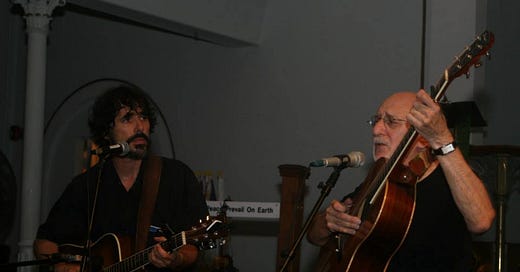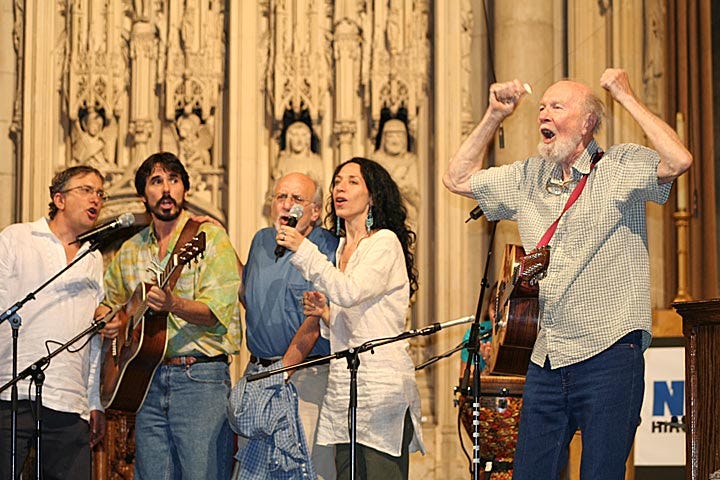January 9, 2025
Peter Yarrow of “Peter Paul & Mary” - died Tuesday at age 86. “The Dragon,” as his family and inner circle sometimes called him, has left the house, but his legacy will live on for generations.
I had the honor of performing alongside Peter a handful of times. I found him to be kind and generous. I first met him at the Kerrville Folk Festival in Texas in 2001. Noel “Paul” Stookey (the “Paul” of Peter Paul & Mary) had invited me to perform my song “Vote!” in a special concert he ran at the festival.
While there, the photographer Robert Corwin introduced me to Peter after privately telling me “Peter is the real thing. He doesn’t just sing and go home. He lives the values he sings. Peter is folk music.”
My interactions with Peter over the next 24 years confirmed that assessment. That’s why I consider him a rare American treasure – a flesh-and-blood embodiment of American folk music.
Sadly, “American Folk Music” has become a controversial term over the past few years. But I stand by my praise. So, let’s look at this one piece at a time.
FOLK MUSIC
There are as many definitions of folk music as there are people defining it. My definition has many layers. Certainly, any songs that “the people” sing can be called “folk” songs. After all, “folk” means people. But I am drawn to a more specific brand of music.
MUSIC OF THE PEOPLE, FOR THE PEOPLE, BY THE PEOPLE
I am drawn to songs that are sung collectively. In harmony. Songs that are embedded into our culture. Songs that undergo the “folk process” in which, as Pete Seeger taught me, we change words to keep them up to date and write new verses to reflect the world we live in today. Add to that new songs we write ourselves that everybody can sing. And also add the old songs and the various ways they have been sung by different groups.
Peter and his group Peter Paul & Mary (PPM) were masters of this genre. They sang unique renditions of songs that were hundreds of years old. “Polly Von,” an Irish folk song dating at least as far back as the 1700’s, stands out. Dozens of variations and even different names of this song have been identified, making it a true “folk” song. And still, PPM’s version sounded original and new.
PPM sang “Michael Row the Boat Ashore” and "Kum ba yah, African American spirituals sung by the Gullah people – primarily slaves and former slaves living on the islands off the coast of South Carolina and Georgia. These songs were recorded by notation in the 1860s. Who wrote them? Nobody’s exactly sure. The best answer is “the people,” thus rendering them “folk” songs.
PPM sang songs popularized by Ledbelly, Woody Guthrie, Pete Seeger and others that have also become songs of the people.
THE AFTERNOON PETER DIED
I sang at an assisted living facility in Somerset, New Jersey only minutes after hearing of Peter’s passing. About thirty people aged 75 to 105 joined in singing “Goodnight Irene,” “This Land is Your Land,” and “Where Have All the Flowers Gone.” We know who wrote (or in Goodnight Irene’s case, claimed to have written) these songs, rendering them by definition outside of the “traditional” folk category. However, because they are baked into the culture millions of Americans grew up with, I still consider them “folk.”
Then, there are the songs popularized by PPM themselves. Bob Dylan’s “Blowin’ in the Wind” was hardly known before PPM sang it at the Newport Folk Festival in 1963. Peter’s own song, “Puff the Magic Dragon” was sung in almost every kindergarten classroom in America.
People at the assisted living show who had advanced Alzheimer’s disease perked up and sang along to “Puff” and “Blowin’” These songs are so deeply embedded in our brains that they are literally unforgettable. And so, they too belong to the “people” and fit my definition of “folk” songs.
HISTORY, LANDSCAPE, CULTURE, VALUES & STRUGGLES
But my definition goes deeper to a level that renders Peter among the most important American folk musicians of our time. It includes songs that reflect and promote our shared history, landscape, culture, values and struggles. Countless PPM songs fit this description. “Midnight Special,” “Motherless Child” and “We Shall Overcome” give voice to the profound struggle of African Americans. “Brother Can You Spare a Dime” and “There But for Fortune” address the struggles of the down and out. There are hundreds more. Peter and PPM, through song, told America’s story.
WHY “AMERICAN” FOLK MUSIC?
This is where the controversy comes in. I’ve been describing my own brand of music as “American Folk Music” since I met Pete Seeger in 2003. But over the past several years, as cultural norms have shifted, I’ve been challenged for using the term. Just this past Thanksgiving, I was accused of being “divisive” simply for calling my music “American.” And no incident was worse than what took place at – get this – a “folk music” conference in Michigan in 2019, hereinafter referred to as the “Conference.”
For reasons I well understand but vehemently disagree with, I was called a racist throughout the weekend by a group of six young white women because I described my music as “American” yet didn’t include songs from Venezuela or Cuba. I was also called a racist and a clueless old white man of privilege because I disagreed with the assertion that America was founded on slavery by white supremacists in 1619 and not on independence by visionaries in 1776.
Isn’t it something? Considering the rhetoric that won the popular vote in this past election, America may very well be moving closer to the 1619 model and away from the vision of 1776. By the logic of the six young women at the Conference, “The Gulf of Mexico” should be renamed “The Gulf of America.” But I think their logic and the support of that logic by the organizers of the Conference are dangerously flawed.
As I fruitlessly attempted to explain to the young women at the Conference, when I refer to “America,” I think little about geographical or political America, nor even the citizens of the United States. Rather, I am referring to an Ideal - that we the people can grow, prosper, and live in harmony through a democratic form of representative government. I think about the founder’s dream that we can devise our own rules and laws – ones originating from the people instead of a pope, rabbi or imam, a king, queen or prince, an autocrat, or an oligarchy of billionaires.
TIRELESS WORK
Although the Ideal can never be fully realized, Peter Yarrow worked tirelessly until the last few months of his life, identifying, celebrating, and promoting the qualities prerequisite to making it a reality. Peter didn’t just sing about equality and diversity. He helped plan the 1963 March on Washington, where PPM led thousands of Americans in singing civil rights songs.
He didn’t just sing about peace. He worked to get people to listen to each other. Until recently, he traveled to Israel/Palestine over and over to lead young Israelis and Palestinians to talk, listen, and make music together.
He didn’t just sing about inclusion. Peter devised a school curriculum based around anti-bullying songs like “Don’t Laugh at Me.”
He used music as a tool for healing when he worked with students of the Marjory Stoneman Douglas High School. In the aftermath of the deadliest mass shooting in U.S. history, Peter was asked to write a song for the students to help channel their trauma into something positive and creative. Instead, he mentored them to write their own songs. Peter’s generosity didn’t end there. He invited me to sing one of the songs with him at a festival in Beacon, New York. And I imagine he invited other musicians to join him at other festivals.
Peter also generously invited me to sing with him in the Finale at the Pete Seeger tribute at Lincoln Center in Manhattan in 2014. In typical Spook Handy fashion, I declined, telling him I was under strict orders not to go back on stage after our group performed. Peter looked me in the eyes and smiling, he asked, “Are you refusing my offer?” It was a playful way of urging me to reconsider. I did, and I joined him, Judy Collins, Mike and Ruthy, Tom Chapin, Guy Davis, Holly Near, Roland Moussa, and Harry Belafonte.
One of Peter’s final endeavors was to support “Braver Angels” – a laudable organization dedicated to getting “Red” and “Blue” Americans in the same room to listen to each other’s viewpoints and concerns and ultimately find and grow common ground.
PETER GOT AMERICA SINGING
The handful of times I shared a stage with Peter, I watched him perform perhaps his greatest service of all. He got people to sing together – in harmony. Following the lead of Pete Seeger a generation before him, Peter got people on the same page singing the same songs but doing so with their own unique voices – contributing their individual talents to the collective experience.
Ronald Reagan couldn’t have misled Americans more. “The American dream” was never about material wealth – owning a house or making a lot of money. Nor does the American dream equate with the slavery, exploitation, and subjugation of 1619. The American dream has always been precisely what in 1776 the founders envisioned could unite the various states within America – the ideal that we can make our own rules and laws that come from us, the people, through representative democracy. The American dream has always been that people of various cultures can live together as one united body. And this can work only if enough people get on the same page, and contribute their individual talents to the collective experience.
Whether the American dream is pursued in the South American state of Venezuela, the Central American state of Honduras, The United States of America, or far off in Timbuktu, what better way can we prepare ourselves for it than to get millions of people singing together? Singing together promotes unity, builds bonds, strengthens community and gives us shared experiences. Singing together about our shared history, landscape, culture, values and struggles, adds identity and purpose. And living the values promoted in and by these songs makes you an embodiment of them.
When you add all of this up, this is what Peter Yarrow did and was. Peter was a personification of American folk music. We will miss his face and warm embrace, but the gift he left us will live on for years.
DREAD NAUGHT, FEARLESS FRIENDS
As Peter sang himself, “a dragon lives forever.” Somewhere in the afterlife, Peter Yarrow will soon be working on his next project to help…
Keep the Flame Alive!
If you find this series valuable, please consider upgrading to a supporting subscriber. This way I can keep “Looking for America” free for those who cannot afford it, and continue writing and giving concerts of hope and optimism, especially in these very challenging times when a clear path through the darkness is not always easy to see.







Wonderful and layered definition of Folk Music, fitting for the genre. I had the great fortune of singing onstage with Peter Yarrow in about 2002 at a pediatric conference. He was promoting his anti-bullying campaign. Very few people went up to join him when invited. After we sang, I spoke with him and he kissed my cheek - a gesture I cherish and will never forget.
Eloquent. A very fine tribute to Peter Yarrow and his deep contribution to America’s journey.